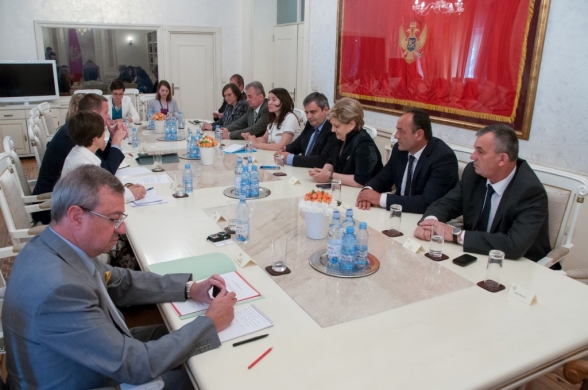Members of the Committee on European Integration today met with Delegation of the Friendship Group for cooperation between the Parliament of Montenegro and the Parliament of France, who are staying in an official visit to Montenegro from 15 to 18 June.
Chairperson of the Committee Mr Slaven Radunović presented the role of this working body, through the ongoing activities and competencies prescribed for by the Rules of Procedure of the Parliament and the Resolution on Manner, Quality and Dynamics of the Integration Process of Montenegro to the European Union, and in that sense he especially emphasised the oversight role of the Committee. Mr Radunović pointed out that Montenegro was facing equally complex tasks as other aspirant countries which have significantly larger administration, but that because of this the country was trying to use positive experiences of others, in order to make progress faster and more efficiently using the principle of lessons learned, with honouring Montenegrin specific features. He added that the accession process was not elitist but that it belonged to all citizens, which was the point of the oversight role, which the Committee was achieving through providing suggestions to the Government during the adoption of negotiating positions. On that occasion, he pointed out the fact that the amendments of positions so far had been the result of consensual decision-making by the Committee members.
In his address to the hosts, Chairperson of the Friendship Group from the National Assembly of France Mr Patrice Verchère said that the Committee on European Integration, considering the issues that it covered and the negotiation stage that Montenegro was in, represented the most significant working body of the Parliament of Montenegro. He especially welcomed the practice of establishing cooperation with other countries in the region which were in the accession process, as well as with new EU member states, aimed at sharing experiences and implementing best practices. He added that the Union membership requirements were stricter with each new wave of enlargement, which stemmed from the experiences gained in the latest accession processes.
During the meeting, members of the French Delegation were inquiring about the effect of using the euro on the national economy and trade relations, when the remaining negotiation chapters would be opened, as well as whether the new EU approach, according to which the negotiations begin by opening the chapter from the field of the rule of law, was limiting for Montenegro or it warranted success in the negotiation process. The Committee members were in agreement on the position that placing focus on chapters 23 and 24 contributed to a higher quality of implementing the necessary reforms, and thus a faster progress of Montenegro towards the EU membership.
The participants in the meeting were: Chairperson of the Friendship Group Mr Patrice Verchère, Deputy Chairperson of the Friendship Group Mr Philippe Gosselin, member of the Committee on Sustainable Development and Spatial Planning Ms Florence Delaunay and member of the Committee on Defence and Armed Forces of the National Assembly of France Ms Geneviève Gosselin-Fleury, as well as Ambassador of the Republic of France to Montenegro Ms Véronique Brumeaux. On behalf of the Committee on European Integration, in addition to the Chairperson Radunović, the participants in the meeting were Deputy Chairperson Ms Marija Maja Ćatović and Committee members: Mr Srđa Popović, Mr Šefkija Murić, Ms Nada Drobnjak, Mr Obrad Mišo Stanišić and Mr Genci Nimanbegu.









